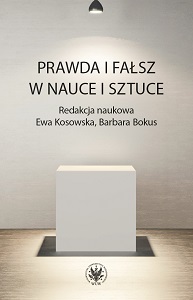Iluzja i prawda w teatrze od baroku po romantyzm
Illusion and truth in the theater from baroque to romanticism
Author(s): Izabella Zatorska
Subject(s): Cultural history, Cognitive Psychology, History of Art
Published by: Wydawnictwa Uniwersytetu Warszawskiego
Keywords: truth; illusion; theater in theater; self-referentiality; mimesis
Summary/Abstract: What does theater represent as a metonymy of literature and art in the turning centuries? The difficulty in applying Aristotle's principle of mimesis was known to French classicist theater. The problem of the elusiveness of the essence of things in times when post-truths were unknown, he presented both figuratively and practically baroque theater: from the theatrum mundi perspective, through the construction of 'theaterin the theater ” (Shakespeare, Pierre Corneille, Molière) showed another, disturbing one the bottom of the "norm of the day". The issue of appearances (Lesage, Marivaux) has brought about Diderot's aesthetic and moral reform, drama theoretician and practice. Radicalin their rebellion, the heroes of Schiller and Musset rejected such a compromise with an illusion, like the possibility of reform, while longing to embody the ideal pure love, ready to destroy others and even themselves if they had that ideal turn out to be a lie. Goodness and responsibility, this is, according to Fr. Tischner - the values on which the supported drama promises that Abel's choice will prevail Cain's election.
Book: Prawda i fałsz w nauce i sztuce
- Page Range: 70-89
- Page Count: 20
- Publication Year: 2020
- Language: Polish
- Content File-PDF

